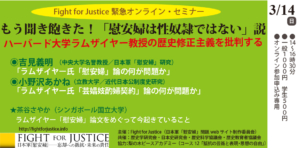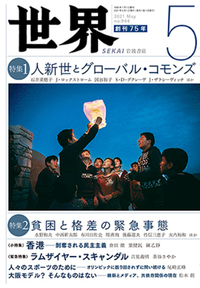2020年12月、ハーバード大学ロースクール教授のジョン・マーク・ラムザイヤー氏が書いた論文「太平洋戦争における性行為契約」が、国際的な学術誌『インターナショナル・レビュー・オブ・ロー・アンド・エコノミクス』(IRLE)のオンライン版に掲載されました。2021年1月31日に、『産経新聞』がこの論文を「「慰安婦=性奴隷」説否定」との見出しで大きくとりあげたことをきっかけに、ラムザイヤー氏とその主張が日本、韓国そして世界で一挙に注目を集めることになりました。
タイトルとは異なり、この論文は太平洋戦争より前に日本や朝鮮で展開されていた公娼制度に多くの紙幅を割いています。実質的な人身売買だった芸娼妓契約について、ゲーム理論を単純に当てはめ、金額や期間などの条件で、業者と芸娼妓の二者間の思惑が合致した結果であるかのように解釈しています。ラムザイヤー氏は、この解釈をそのまま日本軍「慰安婦」制度に応用しました。戦場のリスクを反映して金額や期間が変わった程度で、基本的には同じように朝鮮人「慰安婦」と業者のあいだで合意された契約関係として理解できると主張したのです。しかも、その議論とワンセットのものとして、朝鮮内の募集業者が女性をだましたことはあっても、政府や軍には問題がなかったと、日本の国家責任を否認する主張も展開しました。
つまり、この論文は、「慰安婦」を公娼と同一視したうえで、公娼は人身売買されていたのではなく、業者と利害合致のうえで契約を結んだことにして、「慰安婦」被害と日本の責任をなかったことにしようとしているのです。
私たちは、この論文が専門家の査読をすり抜けて学術誌に掲載されたことに、驚きを禁じ得ません。おそらく日本近代史の専門家によるチェックを受けていなかったのだと思われますが、先行研究が無視されているだけでなく、多くの日本語文献が参照されているわりに、その扱いが恣意的であるうえに、肝心の箇所では根拠が提示されずに主張だけが展開されているという問題があります。以下、主要な問題点を3つに分けて指摘します。
① まず日本軍「慰安婦」制度は公娼制度と深く関係してはいますが、同じではありません。公娼制度とは異なり、慰安所は日本軍が自ら指示・命令して設置・管理し、「慰安婦」も日本軍が直接、または指示・命令して徴募しました。娼妓や芸妓・酌婦だった女性たちが「慰安婦」にさせられた事例は、主に日本人の場合に一部見られたものの、多くの女性は、公娼制度とは関係なく、契約書もないままに、詐欺や暴力や人身売買で「慰安婦」にさせられたことが、膨大な研究から明らかになっています。にもかかわらず、ラムザイヤー氏は日本軍の主体的な関与を示す数々の史料の存在を無視しました。
何よりも氏は、自らの論点にとって必要不可欠であるはずの業者と朝鮮人「慰安婦」の契約書を1点も示していません。こうした根拠不在の主張だけでなく、随所で史料のなかから自説に都合のよい部分のみを使用しています。たとえば、この論文(6頁)で用いられている米戦時情報局の文書(1944年)には、703人の朝鮮人「慰安婦」が、どのような仕事をさせられるかも知らされずに数百円で誘拐ないし人身売買によりビルマに連れて行かれたことを示す記述がありますが、氏はこれを全く無視しています。
② 近代日本の公娼制度の理解にも大きな問題があります。公娼制度下での芸娼妓契約が、実態としては人身売買であり、廃業の自由もなかったことは、既に多数の先行研究と史料で示されています。しかしラムザイヤー氏は、ここでも文献の恣意的使用によって、あるいは根拠も示さずに、娼妓やからゆきさんを自由な契約主体のように論じています。たとえば、この論文(4頁)では『サンダカン八番娼館』を参照し、「おサキさん」が兄によって業者に売られたことについて、業者はだまそうとしていなかったとか、彼女が10歳でも仕事の内容は理解していたなどと主張しています。しかしラムザイヤー氏は、彼女が親方に「嘘つき!」と抗議したことなど、同書に氏の主張をくつがえす内容が記されていることを無視しています。
③ この論文は、そもそも女性の人権という観点や、女性たちを束縛していた家父長制の権力という観点が欠落しています。女性たちの居住、外出、廃業の自由や、性行為を拒否する自由などが欠如していたという意味で、日本軍「慰安婦」制度は、そして公娼制度も性奴隷制だったという研究蓄積がありますが、そのことが無視されています。法と経済の重なる領域を扱う学術誌の論文であるにもかかわらず、当時の国内法(刑法)、国際法(人道に対する罪、奴隷条約、ハーグ陸戦条約、強制労働条約、女性・児童売買禁止条約等)に違反する行為について真摯な検討が加えられた形跡もありません。
以上の理由から、私たちはラムザイヤー氏のこの論文に学術的価値を認めることができません。
それだけではなく、私たちはこの論文の波及効果にも深刻な懸念をもっています。日本の国家責任を全て免除したうえで、末端の業者と当事者女性の二者関係だけで説明しているからこそ、この論文は、一研究者の著述であることをこえて、日本の加害責任を否定したいと欲している人々に歓迎されました。「慰安婦は公娼だった」「慰安婦は自発的な売春婦」「慰安婦は高収入」「慰安婦は性奴隷ではない」……。これらは、1990年代後半から現在まで、日本や韓国などの「慰安婦」被害否定論者たちによって繰り返し主張されてきた言説です。今回、米国の著名大学の日本通の学者が、同様の主張を英字誌に出したことで、その権威を利用して否定論が新たな装いで再び勢いづくことになりました。それとともに、この論文の主張に対する批判を「反日」などと言って攻撃するなど、「嫌韓」や排外主義に根ざした動きが日本社会で再活発化しています。私たちは、このことを深く憂慮しています。
以上を踏まえ、私たちはまずIRLEに対し、この論文をしかるべき査読体制によって再審査したうえで、掲載を撤回するよう求めます。また、日本で再び広められてしまった否定論に対して、私たちは事実と歴史的正義にもとづき対抗していきます。今回の否定論は、日本、韓国、北米など、国境をこえて展開しています。であればこそ私たちは、新たな装いで現れた日本軍「慰安婦」否定論に、国境と言語をこえた連帯によって対処していきたいと考えています。
2021年3月10日 Fight for Justice(日本軍「慰安婦」問題webサイト制作委員会) 歴史学研究会 歴史科学協議会 歴史教育者協議会
2021年3月13日 日本史研究会
2021年3月27日 朝鮮史研究会幹事会
Emergency Statement by Japan-based Researchers and Activists Criticizing a New Form of Denialist Discourse on Japanese Imperial Military “Comfort Women”
In December 2020, the international academic journal International Review of Law and Economics (IRLE) published online Harvard Law School Professor J. Mark Ramseyer’s article “Contracting for Sex in the Pacific War.” On January 31, 2021, Sankei shimbun presented the article’s findings under the headline “Repudiation of the argument that ‘comfort women = sex slaves,’” drawing wider attention to Ramseyer’s claims in Japan, South Korea, and also the world.
In contrast with the title, the actual article devotes a significant amount of space to discussing the pre-Pacific War system of legalized prostitution in Japan and Korea. The author applies principles of game theory simplistically to the contracts of prostitutes, which actually involved human trafficking, and presents these as if they had been agreements resulting from calculations made by two parties, the prostitute and the brothel proprietor, over conditions such as amount of payment and contract duration. Ramseyer then applies this interpretation to the case of the Japanese Imperial Military system of “comfort women.” He asserts that such agreements changed only in terms of pay and duration to reflect the risks of the battlefield, but can be understood as fundamentally the same consensual contractual relationship between Korean “comfort women” and proprietors. Moreover, as part and parcel of this argument, the author argues that, even in cases in which recruiters in Korea deceived women, this did not involve the Japanese government or military. Thus, this argument also denies the Japanese state’s responsibility.
That is to say that this article, in conflating “comfort women” with licensed prostitutes and arguing that licensed prostitutes were not subject to human trafficking but were parties to mutually beneficial contracts with proprietors, is trying to deny that there was any harm done to “comfort women” and that Japan bears any responsibility.
We cannot suppress our astonishment that this article passed through a scholarly peer review process and was published in an academic journal. We can only imagine that it was not checked by a specialist in modern Japanese history. Beyond that, the article not only ignores previous research and treats many cited Japanese sources arbitrarily, but it also makes essential assertions without offering any evidence. Below, we have organized the problematic issues into three main categories.
1) First of all, although the Japanese Imperial Military’s “comfort women” system and the system of licensed prostitution were deeply related, they were not the same. Unlike licensed prostitution, “comfort stations” were set up and managed at the direction and command of the Japanese military itself. “Comfort women” were recruited directly by the Japanese military or by military instruction or command. A vast body of research has made it clear that although there were cases of recruitment of women who had previously worked as prostitutes, geisha, or barmaids especially among Japanese women, most of the women had no involvement in the licensed prostitution system and were made to work as “comfort women” without contracts, through deception, violence, and human trafficking. Nevertheless, Ramseyer ignores the existence of numerous documents demonstrating the active involvement of the Japanese military.
Most crucially, Ramseyer does not provide even one contract between a proprietor and a Korean “comfort woman,” even though such a document should be essential to his own argument. Beyond this kind of unsubstantiated claim, at every instance he uses only those parts of sources that are convenient for his own assertions. For example, a document he cites on page six of his article, a U.S. Office of War Information report from 1944, includes the information that 703 Korean “comfort women” who were brought to Burma did not understand the nature of the work before coming, and that many were subjected to human trafficking or kidnapping. Ramseyer does not acknowledge this information in the source at all.
2) There are also serious problems with his understanding of the modern prostitution system. Both the primary sources themselves and a voluminous historiography on this subject make clear that under the system of licensed prostitution, contracts for prostitutes were actually agreements to buy and sell people. Women were not free to stop working. But Ramseyer, through arbitrary citations to secondary sources and without producing evidence, argues that prostitutes and karayuki-san (women who were trafficked overseas to work at brothels) freely entered into contracts. For example, on page four of his article, he cites Sandakan Brothel Number 8 to assert that the subject, Osaki, who was sold to a proprietor by her older brother, was not deceived by the proprietor and that even at the age of ten she knew what the job entailed. However, Ramseyer ignores several episodes from the book that contradict his assertions, including an instance in which Osaki resisted her employer and called him “a liar.”
3) This article completely lacks any perspective on women’s human rights and overlooks the authority exerted by a patriarchal system that placed restraints on women. Years of accumulated research suggests that—because women were denied freedom of residence, freedom of movement, the freedom to quit prostitution, and the freedom to refuse sexual activity—the Japanese military’s “comfort woman system,” like the system of licensed prostitution itself, was a form of sexual slavery. But this research is ignored in the article. Even though this is an article published in a journal that covers the related fields of law and economics, there is not even a trace of a sincere effort to investigate violations of domestic (criminal) law or international law (such as treaties or conventions concerning crimes against humanity, slavery, forced labor, the sale of women and children, or the Hague Conventions).
For the reasons stated above, we cannot recognize any academic merit in Ramseyer’s article.
Moreover, we are gravely concerned about the spillover effect of Ramseyer’s article. In addition to absolving the Japanese state of responsibility by explaining the “comfort woman” phenomenon in terms of a simple bilateral relationship between two parties (the woman and the proprietor), this article’s significance goes beyond that of simply being a piece of research by one researcher. It has been embraced by people who wish to deny Japan’s responsibility for perpetrating harm. Since the late 1990s, those in Japan, Korea, and elsewhere who deny Japanese state responsibility for the “comfort women” system have insisted on statements similar to those made in Ramseyer’s article: “Comfort women were licensed prostitutes,” “Comfort women were engaged in voluntary prostitution,” “Comfort women were highly compensated,” “Comfort women were not sex slaves.” This article of Ramseyer’s encourages such denialists, who use the authority of an academic journal and Ramseyer’s position as a scholar of Japan at a celebrated university in the United States to launder and regenerate their arguments. In addition, they attack criticism of this article’s claims as “anti-Japanese,” revitalizing an undercurrent of xenophobia and hatred toward Koreans in Japanese society. We are deeply anxious about this.
In light of the above, we would like to first request that the IRLE re-examine this article through an appropriate process of peer review and then, according to the results, retract its publication. In addition, our commitment to facts and historical justice leads us to oppose this denialist argument once again spreading in Japan. The current denialist argument is crossing borders as it expands through Japan, Korea, North America, and elsewhere. This is precisely why we wish to stand against this new form of the denialist argument about the Japanese imperial military’s “comfort women” through a solidarity that transcends borders and languages.
March 10, 2021 Fight for Justice (The Japanese Military “Comfort Women” Issue Website Production Committee) The Historical Science Society of Japan The Association of Historical Science The History Educationalist Conference of Japan
March 13, 2021 The Japanese Society for Historical Studies
March 27, 2021 The Japan Association for Korean History (Committee)
새롭게 위장된 형태로 등장한 일본군「위안부」부정론을 비판하는
일본의 연구자 ・활동가 긴급 성명
2020년12월, 하버드대학 로스쿨 존 마크 램지어 교수가 쓴 논문 [태평양전쟁에서의 성행위 계약]이 국제적인 학술지 <국제법경제리뷰>( IRLE : International Review of Law and Economics)의 온라인판에 게재되었다. 2021년1월31일, 『산케이신문』이 이 논문을 「「위안부=성노예」설의 부정」이라는 타이틀로 크게 게재한 것을 계기로, 램지어 교수와 그의 주장이 일본, 한국 그리고 세계적으로 일거에 주목을 받게 되었다.
타이틀과 달리, 이 논문은 태평양전쟁 이전에 일본이나 조선에서 전개되고 있었던 공창(公娼)제도에 많은 지면을 할애하고 있다. 실질적인 인신매매였던 예창기(芸娼妓)계약에 대해서 게임이론을 단순히 적용하여, 금액이나 기간 등의 조건은, 업자와 예창기의 양자간의 생각이 합치한 결과인 것 처럼 해석하고 있다. 램지어씨는, 이 해석을 그대로 일본군「위안부」제도에 적용하였다. 전장(戦場)의 리스크를 반영해서 금액이나 기간이 바뀐 것 일 뿐, 기본적으로는 동일하게 조선인「위안부」와 업자간의 합의된 계약관계로 이해할 수 있다라고 주장하고 있는 것이다. 게다가, 이 주장과 함께, 조선내의 모집업자가 여성을 속인 것은 있지만, 일본정부나 군에게는 문제가 없었다며, 일본국가의 책임을 부정하는 주장도 전개하고 있다.
즉, 이 논문은 「위안부」를 공창과 동일시하고 있을 뿐만 아니라, 공창은 인신매매된 것이 아니라, 업자와의 이해관계가 일치된 가운데 계약을 맺었으며, 「위안부」의 피해와 일본의 책임을 없었던 것으로 하려고 하고 있는 것이다.
우리들은, 이 논문이 전문가의 심사를 제대로 거치지 않고 학술지에 게재되었다는 것에 대해서 놀라움을 금할 수 없다. 아마도 일본근대사 전문가에 의한 체크를 받지 않은 것이 원인으로 보인다. 이 논문은 선행연구가 무시된 것 만이 아니라, 많은 일본어 문헌이 참조되고 있는 것에 비해서, 그 취급이 자의적인 탓에, 중요한 부분에서는 근거가 제시되지 않은 채 주장만이 전개되고 있다는 문제가 있다. 이하 이 논문의 주요 문제점을 3가지 측면에서 지적한다.
첫째, 일본군「위안부」제도는 공창제도와 깊은 관련이 있지만, 동일한 것은 아니다. 공창제도와는 달리, 위안소는 일본군이 직접 지시, 명령하여 설치, 관리하였고, 「위안부」도 일본군이 직접, 또는 지시, 명령에 의해서 징모(徴募)하였다. 창기(娼妓)나 예기(芸妓)・작부(酌婦)였던 여성들이 「위안부」로 된 사례는, 주로 일본인의 경우는 일부 발견된 사례도 있다. 하지만, 많은 여성들은, 공창제도와는 관계없이, 계약서도 없는 상태로, 사기나 폭력, 인신매매의 형태로 「위안부」로 강제되었다는 것은, 이미 방대한 연구를 통해서 밝혀져 있다. 그럼에도 불구하고 램지어씨는 일본군의 주체적인 관여를 보여주는 수많은 사료(史料)의 존재를 무시하고 있다.
무엇보다 램지어씨는, 자신의 논거에 있어서 필수불가결한 업자와 조선인「위안부」의 계약서를 1점도 제시하지 못하고 있다. 이처럼 근거가 부재한 주장만이 반복될 뿐만 아니라, 여러 곳에서 인용하고 있는 사료중 자신의 주장을 정당화하는 부분만을 채택하고 있다. 예를들어, 이 논문(6페이지)에서 인용하고 있는 미전시정보국(米戦時情報局)의 문서(1944년)에는, 703인의 조선인「위안부」가, 어떠한 일을 하게될지도 알려주지 않은 채 수백엔에 의해서 유괴 또는 인신매매에 의해 미얀마로 연행되었다는 것을 보여주는 기술이 있지만, 램지어씨는 이것을 완전히 무시하고 있다.
둘째, 일본의 공창제도에 대한 이해에도 큰 문제가 있다. 공창제도하에서 芸娼妓(예창기)계약은, 실제로는 인신매매이고, 폐업의 자유가 없었다는 점은, 이미 많은 선행연구와 사료가 보여주고 있다. 그러나 램지어씨는, 여기에서 문헌을 자의적으로 사용하면서, 또한 근거를 제시하지도 않은 채, 창기나 매춘부, 가라유키상을 자유로운 계약의 주체처럼 논하고 있다. 예를들면 이 논문(4페이지)에서는 산다칸8번창관을 참조하여, 「사키 상」이 오빠에 의해서 업자에게 매매된 것에 대해서, 업자가 속이려고 한 것이 아니었다 라든지, 그녀는 10살이었지만 일의 내용은 이해하고 있었다 라고 주장하고 있다. 하지만, 램지어씨는 그녀가 현장감독에게 [거짓말쟁이!]라고 항의한 것 등, 동 문서에 그의 주장을 반박하는 내용이 기재되어있는 것은 무시하고 있다.
셋째, 이 논문은 근본적으로 여성의 인권이라는 관점이나, 여성들을 속박하고 있던 가부장제 권력의 관점들이 결여되어 있다. 여성들의 거주, 외출, 폐업의 자유, 성행위를 거부할 자유 등이 결여되어 있다는 점에 있어서, 일본군「위안부」제도, 그리고 공창제도도 성노예제였다는 연구의 축적은 이미 많이 되어있다. 하지만, 이 논문에서는 이런 연구들이 무시되고 있다. 법과 경제의 겹치는 영역을 다루는 학술지의 논문임에도 불구하고, 당시의 국내법(형법), 국제법(인도에 대한 죄, 노예조약, 헤이그육전조약(ハーグ陸戦条約), 강제노동조약, 여성・아동매춘금지조약 등)에 위반하는 행위에 대해서 진지한 검토가 이루어졌다는 흔적을 찾을 수가 없다.
이상과 같은 이유로, 우리들은 램지어씨의 이 논문에는 학술적인 가치를 인정할 수가 없다. 뿐만 아니라, 우리들은 이 논문의 파급효과에 대해서도 심각한 우려를 하고 있다. 이 논문은 일본국가의 책임을 완전히 면제하고 있을 뿐만 아니라, 말단 업자와 당사자 여성과의 양자관계만으로 설명을 하고 있기 때문에, 한 연구자의 저술이라는 것을 넘어서, 일본의 가해책임을 부정하고 싶어서 안달하고 있는 이들의 환영을 받고 있다. 「위안부는 공창(公娼)이었다」 「위안부는 자발적인 매춘부」 「위안부는 고수입」 「위안부는 성노예가 아니다」……。이런 주장들은, 1990년대 후반부터 현재까지, 일본이나 한국 등에서 「위안부」피해 부정론자들이 반복적으로 주장해 온 언설이다. 이번 미국 저명대학의 일본전문 학자가, 동일한 주장을 영문 학술지에 발표한 것에 의해, 그 권위를 이용해서 부정론이 새롭게 포장되어 다시 세력을 확대하고 있다. 뿐만 아니라, 이 논문의 주장에 대한 비판을 「반일」이라며 공격하는 등, 「혐한」이나 배외주의에 뿌리깊은 움직임이 일본사회에서 다시 활발해지고 있다. 우리들은, 이런 상황을 심각하게 우려하고 있는 것이다.
이상과 같은 연유로, 우리들은 먼저 IRLE에 대해서, 이 논문에 대해서 신뢰할 수 있는 사독(査読)체제에 기반해서 재심사를 한 후, 게재를 철회할 것을 요구한다. 또한, 일본에서 다시 확대되고 있는 부정론에 대해서, 우리들은 사실과 역사적 정의에 기반해서 대응해 나갈 것이다. 이번 부정론은, 일본, 한국, 북미 등 국경을 넘어서 전개되고 있다. 그렇기 때문에 우리들은, 새롭게 위장된 형태로 나타난 일본군「위안부」부정론에 대해서, 국경과 언어를 넘어서 연대하며 대처해 나갈 것이다.
2021년3월10일 Fight for Justice(일본군「위안부」문제web사이트 제작위원회) 역사학연구회(歴史学研究会) 역사과학협의회(歴史科学協議会) 역사교육자협의회(歴史教育者協議会)
2021년3월13일 일본사연구회 (日本史研究会)
2021년3월27일 조선사연구회 간사회(朝鮮史研究会幹事会)




